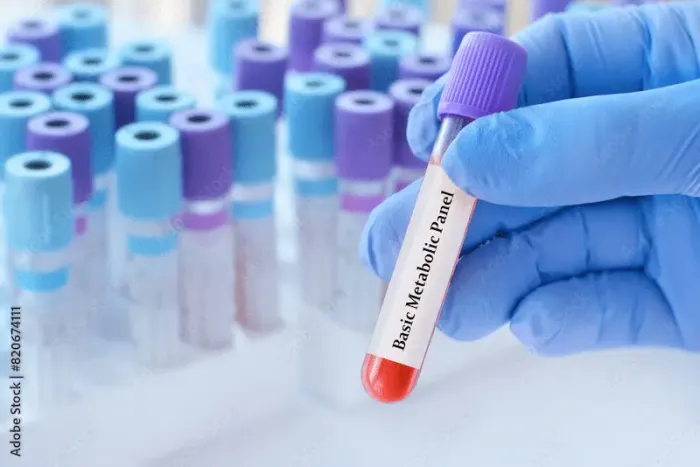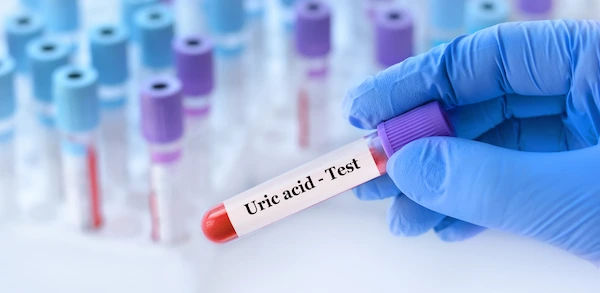Basic Metabolic Panel Overview and Procedure
Know about the basic metabolic panel, what it is, why this test is done, how test is done and interpretation of the results. Learn about the tips for staying healthy.


Introduction
When it comes to monitoring your health, blood tests play a crucial role in detecting potential issues before they become serious. One such important test is the Basic Metabolic Panel (BMP). If your doctor has recommended this test, you might have questions about what it is, why it’s needed, and how it’s done. This article will guide you through everything you need to know in simple, easy-to-understand terms.
What is a Basic Metabolic Panel (BMP)?
A Basic Metabolic Panel (BMP) is a group of blood tests that provides essential information about your body’s chemical balance and metabolism. It helps doctors evaluate how well your kidneys, liver, and other key organs are functioning.
The BMP measures several important substances in your blood, including:
1. Glucose – Indicates blood sugar levels (helps detect diabetes).
2. Electrolytes:
• Sodium (regulates fluid balance)
• Potassium (important for nerve and muscle function)
• Chloride (helps maintain fluid balance and acidity levels)
• Carbon Dioxide (CO₂) (indicates kidney and lung function)
3. Kidney Function Markers:
• Blood Urea Nitrogen (BUN) – Measures kidney waste removal.
• Creatinine – Another indicator of kidney health.
4. Calcium – Essential for bone health, nerve function, and muscle movement.
Consult a General Practitioner for Personalised Advice
Why is a BMP Test Done?
Your doctor may order a BMP for several reasons, including:
• Routine Check-up: To assess overall health during an annual physical.
• Monitoring Chronic Conditions: Such as diabetes, kidney disease, or high blood pressure.
• Evaluating Symptoms: Like fatigue, nausea, vomiting, dehydration, or irregular heartbeats.
• Before Surgery: To ensure your body can handle anaesthesia and recovery.
• Medication Monitoring: Some medicines (like diuretics or blood pressure drugs) can affect electrolyte levels.
How is the BMP Test Performed?
The BMP is a simple blood test that takes just a few minutes. Here’s what to expect:
Before the Test:
• Fasting: Some doctors may ask you to fast (not eat or drink anything except water) for 8-12 hours before the test, especially if glucose levels are being checked.
• Medications: Inform your doctor about any medications or supplements you take, as they might affect results.
During the Test:
1. A healthcare professional will clean your arm (usually near the elbow) with an antiseptic.
2. A small needle is inserted into a vein to draw blood into a tube.
3. You may feel a slight pinch, but the discomfort is minimal.
4. The blood sample is sent to a lab for analysis.
After the Test:
• You can resume normal activities immediately.
• Minor bruising or soreness at the puncture site may occur but usually fades quickly.
Understanding Your BMP Results
Your doctor will review the results and explain what they mean. Here’s a general idea of what normal and abnormal levels could indicate:
Test | Normal Range | Possible Concerns if Abnormal |
Glucose | 70-99 mg/dL (fasting) | High: Diabetes risk; Low: Hypoglycemia |
Sodium | 135-145 mEq/L | High: Dehydration; Low: Overhydration, kidney issues |
Potassium | 3.5-5.0 mEq/L | High: Kidney problems; Low: Diarrhoea, medication side effects |
Chloride | 96-106 mEq/L | Imbalance may indicate dehydration or kidney disease |
CO₂ | 23-29 mEq/L | High: Lung disease; Low: Kidney issues |
BUN | 7-20 mg/dL | High: Dehydration, kidney disease |
Creatinine | 0.6-1.3 mg/dL | High: Kidney dysfunction |
Calcium | 8.5-10.2 mg/dL | High: Hyperparathyroidism; Low: Vitamin D deficiency |
If any levels are outside the normal range, your doctor may recommend further tests or lifestyle changes.
Tips for Maintaining Healthy Metabolic Levels
While some conditions require medical treatment, you can support your metabolic health with these simple habits:
• Stay Hydrated – Drink enough water to help kidney function and electrolyte balance.
• Eat a Balanced Diet – Include fruits, vegetables, whole grains, and lean proteins. Limit processed foods and excess salt.
• Monitor Blood Sugar – If diabetic, follow your doctor’s advice on diet, exercise, and medication.
• Exercise Regularly – Helps regulate glucose and maintain a healthy weight.
• Limit Alcohol & Caffeine – Excessive intake can affect kidney and electrolyte balance.
• Get Regular Check-ups – Early detection of imbalances can prevent complications.
When to Consult a Doctor?
If your BMP results are abnormal, your doctor will guide you on the next steps. However, seek medical advice if you experience:
• Persistent fatigue
• Frequent urination or thirst (signs of diabetes)
• Swelling in legs (kidney issues)
• Muscle cramps or irregular heartbeat (electrolyte imbalance)
Final Thoughts
A Basic Metabolic Panel is a simple yet powerful tool to assess your body’s vital functions. Whether for routine screening or diagnosing a health concern, this test provides valuable insights. By understanding your results and making healthy lifestyle choices, you can take proactive steps toward better well-being.
Consult a General Practitioner for Personalised Advice
Consult a General Practitioner for Personalised Advice

Dr. M L Ezhilarasan
General Practitioner
6 Years • MBBS
Visakhapatnam
Apollo 24|7 Clinic - Andhra Pradesh, Visakhapatnam

Dr D M Karthik
General Practitioner
4 Years • MBBS, Fellowship in Diabetes Mellitus, Advance certificate in Diabetes Mellitus, Derma Nutrition Certification
Visakhapatnam
Apollo 24|7 Clinic - Andhra Pradesh, Visakhapatnam

Dr. Mohammed Kamran
General Practitioner
5 Years • MBBS, FIDM
Nashik
Apollo 24|7 Clinic - Maharashtra, Nashik
Dr. Gaddam Manoj
General Practitioner
1 Years • MBBS
Hyderabad
Aaradhya clinic, Hyderabad

Dr. Madhuri Sai Sreepada
General Practitioner
9 Years • MBBS
Hyderabad
BRIGHT SMILES MEDICARE & DENTAL CARE, Hyderabad
Consult a General Practitioner for Personalised Advice

Dr. M L Ezhilarasan
General Practitioner
6 Years • MBBS
Visakhapatnam
Apollo 24|7 Clinic - Andhra Pradesh, Visakhapatnam

Dr D M Karthik
General Practitioner
4 Years • MBBS, Fellowship in Diabetes Mellitus, Advance certificate in Diabetes Mellitus, Derma Nutrition Certification
Visakhapatnam
Apollo 24|7 Clinic - Andhra Pradesh, Visakhapatnam

Dr. Mohammed Kamran
General Practitioner
5 Years • MBBS, FIDM
Nashik
Apollo 24|7 Clinic - Maharashtra, Nashik
Dr. Gaddam Manoj
General Practitioner
1 Years • MBBS
Hyderabad
Aaradhya clinic, Hyderabad

Dr. Madhuri Sai Sreepada
General Practitioner
9 Years • MBBS
Hyderabad
BRIGHT SMILES MEDICARE & DENTAL CARE, Hyderabad
